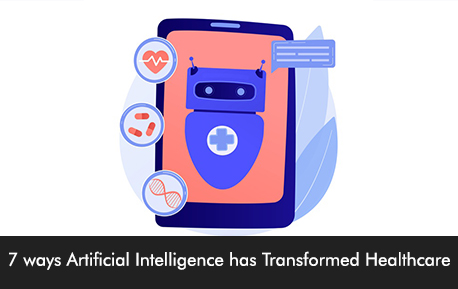Artificial Intelligence (AI) powered solutions have various implications in the healthcare sector. AI has helped practitioners and patients to streamline tasks that may take a longer time and has also reduced costs. The modern healthcare system in the USA is leveraging AI technology to maximize hospital efficiency, improve patient diagnosis and tackle the COVID-19 pandemic crisis.
How Artificial Intelligence and Machine Learning will impact Healthcare?
- Reduction in errors – AI technology and machine learning is used by hospitals to reduce human errors and enhance patient outcome levels. Medical errors in the year 2015 resulted in 10% of all deaths in the United States, this means any margin of error can take lives. Machine learning technology using algorithms helps providers to accurately diagnose. Currently, AI technology is being used to reduce any errors in cancer diagnosis by supporting pathologists.
- Effective symptom checker – Patient’s symptoms can also be effectively checked with the help of algorithms and a chatbot. Interestingly it works easily, a patient-related their symptoms to a chatbot and the chatbot then guide the patient to the best treatment path based on the diagnosis. For example, Harvard Medical School is deploying Artificial Intelligence to treat patients quickly and accurately.
- Simplify diagnosis – AI-powered deep learning tools are being used to streamline radiology diagnosis by providing valuable insights to healthcare providers. The deep learning technology examines data related to blood tests, patient history, and radiology images to support the patient treatment process by helping doctors with actionable insights to take a proactive approach.
- Detect cancer – AI is also being used in a few hospitals in America to detect cancer at earlier stages where it can be cured easily. By leveraging AI at general screenings cancer can be spotted at stages where the patient can be treated effectively.
- Systematize administrative procedures – Artificial Intelligence is being used to automate workflow and hospital administrative tasks which can save a lot of money. Voice to text transcription can be used to prescribe medication and chart notes. The technology is also being using by clinicians to evaluate thousands of medical papers.
- Reduce care disparities – We see the disparity and healthcare gap between developed and underdeveloped areas and fortunately, Artificial Intelligence can be used to fill this gap by providing equal opportunities of care to populations in the outskirts. For example, AI imaging screen tools can be used through an app available to providers in underdeveloped areas hence the need to have a completely trained radiologist at the site is not required.
- Efficient EMR Software systems – By deploying AI the efficiency of Electronic Medical Records (EMR) software systems can enhance. Many EHR software vendors are using Artificial Intelligence to make the software systems more intuitive and user-friendly for providers. Clinical documentation can also be simplified and enhanced with voice recognition and dictation tools.
Moving Ahead
AI and machine learning is revolutionizing the way how doctors operate and are improving the patient treatment processes. By empowering clinicians and providing accurate diagnoses the world can expect innovations by leveraging the power of AI tech.







